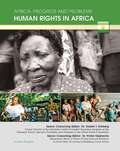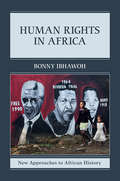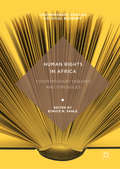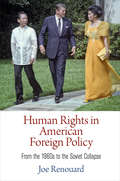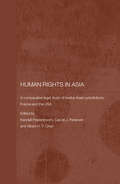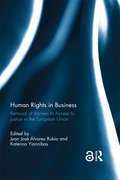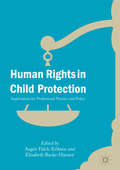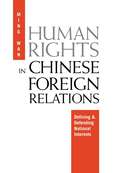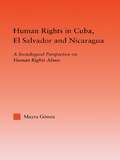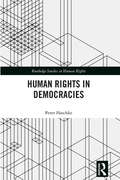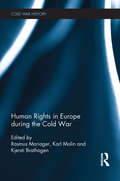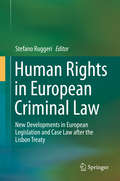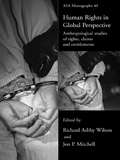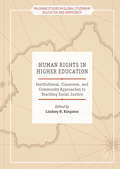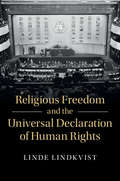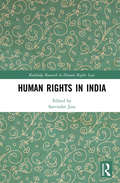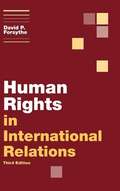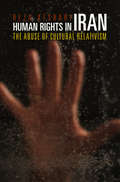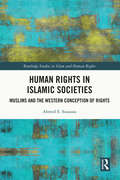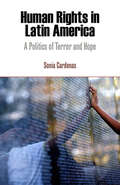- Table View
- List View
Human Rights in Africa (Africa: Progress and Problems)
by Brian BaughanHuman rights are the fundamental freedoms and privileges to which every individual is entitled. Most people agree that basic rights include the liberty to practice a particular religion, express a political view, or associate with a certain group of people without prejudice, discrimination, or exploitation. Unfortunately, as international organizations like Freedom House have noted, human rights are routinely violated or ignored in many African countries. This book discusses the history behind the as-yet-unfinished struggle to secure fundamental rights and freedoms for all Africans. It also explains the roles that can be played by organizations like the United Nations and the African Union, NGOs such as Amnesty International and Human Rights Watch, and national governments in advancing the cause of human rights.
Human Rights in Africa (New Approaches to African History #12)
by Bonny IbhawohHuman rights have a deep and tumultuous history that culminates in the age of rights we live in today, but where does Africa's story fit in with this global history? Here, Bonny Ibhawoh maps this story and offers a comprehensive and interpretative history of human rights in Africa. Rather than a tidy narrative of ruthless violators and benevolent protectors, this book reveals a complex account of indigenous African rights traditions embodied in the wisdom of elders and sages; of humanitarians and abolitionists who marshalled arguments about natural rights and human dignity in the cause of anti-slavery; of the conflictual encounters between natives and colonists in the age of Empire and the 'civilizing mission'; of nationalists and anti-colonialists who deployed an emergent lexicon of universal human rights to legitimize longstanding struggles for self-determination, and of dictators and dissidents locked in struggles over power in the era of independence and constitutional rights.
Human Rights in Africa: Contemporary Debates and Struggles (Contemporary African Political Economy)
by Eunice N. SahleThis edited collection explores key human rights themes and situates them in the context of developments on the African continent. It examines critical debates in human rights bringing together conceptually and empirically rich contributions from leading thinkers in human rights and African studies. Drawing on scholarly insights from the fields of constitutional law, human rights, development, feminist studies, public health, and media studies, the volume contributes to scholarly debates on constitutionalism, the right to water, securitization of development, environmental and transitional justice, sexual rights, conflict and gender-based violence, the right to development, and China’s deepening role in Africa. Consequently, it makes an important scholarly intervention on timely issues pertaining to the African continent and beyond.
Human Rights in American Foreign Policy
by Joe RenouardInternational human rights issues perpetually highlight the tension between political interest and idealism. Over the last fifty years, the United States has labored to find an appropriate response to each new human rights crisis, balancing national and global interests as well as political and humanitarian impulses.Human Rights in American Foreign Policy explores America's international human rights policies from the Vietnam War era to the end of the Cold War. Global in scope and ambitious in scale, this book examines American responses to a broad array of human rights violations: torture and political imprisonment in South America; apartheid in South Africa; state violence in China; civil wars in Central America; persecution of Jews in the Soviet Union; movements for democracy and civil liberties in East Asia and Eastern Europe; and revolutionary political transitions in Iran, Nicaragua, and the collapsing USSR.Joe Renouard challenges the characterization of American human rights policymaking as one of inaction, hypocrisy, and double standards. Arguing that a consistent standard is impractical, he explores how policymakers and citizens have weighed the narrow pursuit of traditional national interests with the desire to promote human rights. Human Rights in American Foreign Policy renders coherent a series of disparate foreign policy decisions during a tumultuous time in world history. Ultimately the United States emerges as neither exceptionally compassionate nor unusually wicked. Rather, it is a nation that manages by turns to be cautiously pragmatic, boldly benevolent, and coldly self-interested.
Human Rights in Armed Conflict: Law, Practice, Policy
by Gerd OberleitnerIt is now widely accepted that international human rights law applies in situations of armed conflict alongside international humanitarian law, but the contours and consequences of this development remain unclear. This book revisits, organizes and contextualizes the debate on human rights in armed conflict and explores the legal challenges, operational consequences and policy implications of resorting to human rights in situations of inter- and intra-state violence. It presents the benefits and the drawbacks of using international human rights law alongside humanitarian law and discusses how the idea, law and policy of human rights influence the development of the law of armed conflict. Based on legal theory, policy analysis, state practice and the work of human rights bodies it suggests a human rights-oriented reading of the law of armed conflict as feasible and necessary in response to the changing character of war.
Human Rights in Asia: A Comparative Legal Study of Twelve Asian Jurisdictions, France and the USA (Routledge Law in Asia #Vol. 2)
by Randall Peerenboom Albert H. Y. Chen Carole J. PetersenHuman Rights in Asia considers how human rights are viewed and implemented in Asia. It covers not just civil and political rights, but also social, economic and cultural rights. This study discusses the problems arising from the fact that ideas of human rights have evolved in Western liberal democracies and examines how far such values are compatible with Asian values and applicable in Asian contexts. Core chapters on France and the USA provide a benchmark on how human rights have emerged and how they are applied and implemented in a civil law and a common law jurisdiction. These are then followed by twelve chapters on the major countries of East Asia plus India, each of which follows a common template to consider the context of the legal system in each country, black letter law, legal discussions and debates and key current issues concerning human rights in each jurisdiction.
Human Rights in Business: Removal of Barriers to Access to Justice in the European Union
by Katerina Yiannibas Juan José Álvarez RubioThe capacity to abuse, or in general affect the enjoyment of human, labour and environmental rights has risen with the increased social and economic power that multinational companies wield in the global economy. At the same time, it appears that it is difficult to regulate the activities of multinational companies in such a way that they conform to international human, labour and environmental rights standards. This has partially to do with the organization of companies into groups of separate legal persons, incorporated in different states, as well as with the complexity of the corporate supply chain. Absent a business and human rights treaty, a more coherent legal and policy approach is required. Faced with the challenge of how to effectively access the right to remedy in the European Union for human rights abuses committed by EU companies in non-EU states, a diverse research consortium of academic and legal institutions was formed. The consortium, coordinated by the Globernance Institute for Democratic Governance, became the recipient of a 2013 Civil Justice Action Grant from the European Commission Directorate General for Justice. A mandate was thus issued for research, training and dissemination so as to bring visibility to the challenge posed and moreover, to provide some solutions for the removal of barriers to judicial and non-judicial remedy for victims of business-related human rights abuses in non-EU states. The project commenced in September 2014 and over the course of two years the consortium conducted research along four specific lines in parallel with various training sessions across EU Member States. The research conducted focused primarily on judicial remedies, both jurisdictional barriers and applicable law barriers; non-judicial remedies, both to company-based grievance. The results of this research endeavour make up the content of this report whose aim is to provide a scholarly foundation for policy proposals by identifying specific challenges relevant to access to justice in the European Union and to provide recommendations on how to remove legal and practical barriers so as to provide access to remedy for victims of business-related human rights abuses in non-EU states.
Human Rights in Child Protection: Implications For Professional Practice And Policy
by Asgeir Falch-Eriksen Elisabeth Backe-HansenThis open access book critically explores what child protection policy and professional practice would mean if practice was grounded in human rights standards. This book inspires a new direction in child protection research – one that critically assesses child protection policy and professional practice with regard to human rights in general, and the rights of the child in particular. Each chapter author seeks to approach the rights of the child from their own academic field of interest and through a comparative lens, making the research relevant across nation-state practices. The book is split into five parts to focus on the most important aspects of child protection. The first part explains the origins, aim, and scope of the book; the second part explores aspects of professionalism and organization through law and policy; and the third part discusses several key issues in child protection and professional practice in depth. The fourth part discusses selected areas of importance to child protection practices (low-impact in-house measures, public care in residential care and foster care respectively) and the fifth part provides an analytical summary of the book. Overall, it contributes to the present need for a more comprehensive academic debate regarding the rights of the child, and the supranational perspective this brings to child protection policy and practice across and within nation-states.
Human Rights in Chinese Foreign Relations: Defining and Defending National Interests (Pennsylvania Studies in Human Rights)
by Ming WanFew issues in the relations between China and the West invoke as much passion as human rights. At stake, however, are much more than moral concerns and hurt national feelings. To Washington, the undemocratic nature of the Chinese government makes it ultimately suspect on all issues. To Beijing, the human rights pressure exerted by the West on China seems designed to compromise its legitimacy. As China's economic power grows and its influence on the politics of developing countries continues, an understanding of the place of human rights in China's foreign relations is crucial to the implementation of an effective international human rights agenda.In Human Rights in Chinese Foreign Relations, Ming Wan examines China's relations with the United States, Western Europe, Japan, and the United Nations human rights institutions.Wan shows that, after a decade of persistent external pressure to reform its practices, China still plays human rights diplomacy as traditional power politics and deflects pressure by mobilizing its propaganda machine to neutralize Western criticism, by making compromises that do not threaten core interests, and by offering commercial incentives to important nations to help prevent a unified Western front. Furthermore, at the UN, China has largely succeeded in rallying developing nation members to defeat Western efforts at censure.In turn, it is apparent to Wan that, while the idea of human rights matters in Western policy, it has seldom prevailed over economic considerations or concerns about national security. Western governments have not committed as many policy resources to pressuring Beijing on human rights as to other issues, and the differing degrees of commitment to human rights-related foreign policy explain why Japan, Western Europe, and the United States, in that order, have gradually retreated from confronting China on human rights issues.
Human Rights in Cuba, El Salvador and Nicaragua: A Sociological Perspective on Human Rights Abuse (Studies in International Relations)
by Mayra GomezThis book presents a historical perspective on patterns of human rights abuse in Cuba, El Salvador and Nicaragua and incorporates international relations in to the traditional theories of state repression found within the social sciences.
Human Rights in Democracies (Routledge Studies in Human Rights)
by Peter HaschkeViolations of the right to the physical integrity of the person, such as torture, cruel and unusual punishment, extra-judicial executions, disappearances, and political imprisonment have long been treated as an anomaly in democratically governed societies. In the current literature on human rights, violations of this right are by-and-large seen as the hallmark of autocratic and repressive regimes. This study takes on this dominant paradigm and shows not only that the common assumption that democratic countries effectively limit human rights abuse is simply wrong, but that its widely accepted theory of what drives human rights violations accounts for only a small part of these abuses at best. Haschke shows that despite the increasing numbers of countries that are democracies, and despite growing numbers of national signatories to international treaties prohibiting human rights abuse, the number of allegations has not declined. This book also demonstrates that the bulk of this abuse, which takes the form of torture and ill-treatment, extra-judicial killings, rape, and the like, is committed against marginal members of society, seeming to reveal environments that enable agents of the state to abuse those with whom they are in contact. This violence is found in democracies and dictatorships alike. This work will be of interest to students and scholars of international relations, human rights and comparative politics.
Human Rights in Europe during the Cold War (Cold War History)
by Rasmus Mariager Karl Molin Kjersti BrathagenThis book provides an overview of the establishment, dispersion and effects of human rights in Europe during the Cold War. The struggle for human rights did not begin at the end of the Second World War. For centuries, political associations, religious societies and individuals had been fighting for political freedom, religious tolerance, freedom of expression, freedom of thought and the right to participate in politics. However, the world was awakened by the atrocities of the Second World War and the idea that every person should have certain perpetual and inalienable rights was set out in The Universal Declaration of Human Rights (UDHR) from 1948, which contained an enumeration of international human rights standards. Adopting an interpretative framework which pulls together universal ideas, values and principles of human rights, Human Rights in Europe during the Cold War demonstrates how conflicting interests collided when the exact meaning of human rights was established. It also discusses various approaches to the idea of imposing respect for human rights in countries where they were systematically violated and assesses the outcome of international accords on human rights, in particular the 1975 Helsinki Final Act. In conclusion, this volume proposes that human rights functioned as moral support to the opposition in repressive regimes and that this was subsequently used as a tool to further system changes. Based on new archival research, this book will be of much interest to students of Cold War studies, human rights, European history, international law and IR in general.
Human Rights in European Criminal Law
by Stefano RuggeriThis book deals with human rights in European criminal law after the Lisbon Treaty. Doubtless the Lisbon Treaty has constituted a milestone in the development of European criminal justice. Not only has the reform following the Treaty given binding force to the EU Charter of Fundamental Rights, but furthermore it has paved the way for unprecedented forms of supranational legislation. In this scenario, the enforcement of individual rights in criminal matters has become a core goal of EU legislation. Alongside these developments, new interactions between national and supranational jurisprudences have emerged, which have significantly contributed to a human rights-oriented approach to European criminal law. The book analyses the main developments of this complex phenomenon from an interdisciplinary perspective. Criminal and procedural law, constitutional law and comparative law must thus be combined to achieve a full understanding of these developments and of their impact on national law.
Human Rights in Global Perspective: Anthropological Studies of Rights, Claims and Entitlements (ASA Monographs)
by Richard Ashby Wilson Jon P. MitchellIn the West we frequently pay lip service to universal notions of human rights. But do we ever consider how these work in local contexts and across diverse cultural and ethical structures? Do human rights agendas address the problems many people face, or are they more often the imposition of Western values onto largely non-Western communities?Human Rights in a Global Perspective develops a social critique of rights agendas. It provides an understanding of how rights discussions and institutions can construct certain types of subjects such as victims and perpetrators, and certain types of act, such as common crimes and crimes against humanity. Using examples from the United States, Europe, India and South Africa, the authors restore the social dimension to rights processes and suggest some ethical alternatives to current practice.
Human Rights in Higher Education: Institutional, Classroom, And Community Approaches To Teaching Social Justice (Palgrave Studies In Global Citizenship Education And Democracy Ser.)
by Lindsey N. KingstonThis book focuses on human rights education (HRE) in higher education, with an emphasis on supporting undergraduate education for social justice and global citizenship at the institutional, classroom, and community levels. Drawing from the work of human rights scholars and advocates at Webster University, Kingston begins a critical discussion about the potential of HRE on college campuses and beyond. Chapter contributors address the institutional issues inherent to building a “human rights campus,” promoting just governance models, facilitating student research, and fostering inclusive campus communities. They further explore opportunities within the classroom by highlighting dynamic courses on global sustainable development and post-genocide reconciliation, as well as considering how to create trauma sensitive learning spaces and utilize photography as a human rights teaching tool. Finally, scholar-advocates detail how HRE can be expanded to include the broader community—including teaching critical criminology to aspiring police officers, facilitating community dialogue through academic conferences, and engaging in social justice work related to access to justice, domestic violence, and human trafficking.
Human Rights in History: Cold War Germany, the Third World, and the Global Humanitarian Regime
by Young-Sun HongThis book examines competition and collaboration among Western powers, the socialist bloc, and the Third World for control over humanitarian aid programs during the Cold War. Young-sun Hong's analysis reevaluates the established parameters of German history. On the one hand, global humanitarian efforts functioned as an arena for a three-way political power struggle. On the other, they gave rise to transnational spaces that allowed for multidimensional social and cultural encounters. Hong paints an unexpected view of the global humanitarian regime: Algerian insurgents flown to East Germany for medical care, barefoot Chinese doctors in Tanzania, and West and East German doctors working together in the Congo. She also provides a rich analysis of the experiences of African trainees and Asian nurses in the two Germanys. This book brings an urgently needed historical perspective to contemporary debates on global governance, which largely concern humanitarianism, global health, south-north relationships, and global migration.
Human Rights in History: Religious Freedom and the Universal Declaration of Human Rights (Human Rights in History)
by Linde LindkvistArticle 18 of the Universal Declaration of Human Rights (1948) is widely considered to be the most influential statement on religious freedom in human history. Religious Freedom and the Universal Declaration of Human Rights provides a groundbreaking account of its origins and developments, examining the background, key players, and outcomes of Article 18, and setting it within the broader discourse around international religious freedom in the 1940s. Taking issue with standard accounts that see the text of the Universal Declaration as humanity's joint response to the atrocities of World War II, it shows instead how central features of Article 18 were intimately connected to the political projects and visions of particular actors involved in the start-up of the UN Human Rights program. This will be essential reading for anyone grappling with the historical and contemporary meaning of human rights and religious freedom.
Human Rights in History: The Care of the Witness
by Michal GivoniDuring the twentieth century, witnessing grew to be not just a widespread solution for coping with political atrocities but also an intricate problem. As the personal experience of victims, soldiers, and aid workers acquired unparalleled authority as a source of moral and political truth, the capacity to generate adequate testimonies based on this experience was repeatedly called into question. Michal Givoni's book follows the trail of the problems, torments, and crises that became commingled with witnessing to genocide, disaster, and war over the course of the twentieth century. By juxtaposing episodes of reflexive witnessing to the Great War, the Jewish Holocaust, and third world emergencies, The Care of the Witness explores the shifting roles and responsibilities of witnesses in history and the contribution that the troubles of witnessing made to the ethical consolidation of the witness as the leading figure of nongovernmental politics.
Human Rights in History: The Making of International Human Rights
by Jensen Steven L. B.This book fundamentally reinterprets the history of international human rights in the post-1945 era by documenting how pivotal the Global South was for their breakthrough. In stark contrast to other contemporary human rights historians who have focused almost exclusively on the 1940s and the 1970s - heavily privileging Western agency - Steven L. B. Jensen convincingly argues that it was in the 1960s that universal human rights had their breakthrough. This is a ground-breaking work that places race and religion at the center of these developments and focuses on a core group of states who led the human rights breakthrough, namely Jamaica, Liberia, Ghana, and the Philippines. They transformed the norms upon which the international community today is built. Their efforts in the 1960s post-colonial moment laid the foundation - in profound and surprising ways - for the so-called human rights revolution in the 1970s, when Western activists and states began to embrace human rights.
Human Rights in History: The Right of Self-Determination of Peoples
by Fisch, Jörg and Mage, Anita Jörg Fisch Anita MageThe right of self-determination of peoples holds out the promise of sovereign statehood for all peoples and a domination-free international order. But it also harbors the danger of state fragmentation that can threaten international stability if claims of self-determination lead to secessions. Covering both the late eighteenth- and early nineteenth-century independence movements in the Americas and the twentieth-century decolonization worldwide, this book examines the conceptual and political history of the right of self-determination of peoples. It addresses the political contexts in which the right and concept were formulated and the practices developed to restrain its potentially anarchic character, its inception in anti-colonialism, nationalism, and the labor movement, its instrumentalization at the end of the First World War in a formidable duel that Wilson lost to Lenin, its abuse by Hitler, the path after the Second World War to its recognition as a human right in 1966, and its continuing impact after decolonization.
Human Rights in India (Routledge Research in Human Rights Law)
by Satvinder JussThis volume presents an integrated collection of essays around the theme of India’s failure to grapple with the big questions of human rights protections affecting marginalized minority groups in the country’s recent rush to modernization. The book traverses a broad range of rights violations from: gender equality to sexual orientation, from judicial review of national security law to national security concerns, from water rights to forest rights of those in need, and from the persecution of Muslims in Gulberg to India’s parallel legal system of Lok Adalats to resolve disputes. It calls into question India’s claim to be a contemporary liberal democracy. The thesis is given added strength by the authors’ diverse perspectives which ultimately create a synergy that stimulates the thinking of the entire field of human rights, but in the context of a non-western country, thereby prompting many specialists in human rights to think in new ways about their research and the direction of the field, both in India and beyond. In an area that has been under-researched, the work will provide valuable guidance for new research ideas, experimental designs and analyses in key cutting-edge issues covered in this work, such as Acid Attacks or the right to protest against the ‘nuclear’ state in India.
Human Rights in International Relations
by David P. ForsytheThis third edition of David P. Forsythe's successful textbook provides an authoritative overview of the place of human rights in an age of upheaval in international politics. Human rights standards are examined at the global, regional and national levels, with separate chapters on transnational corporations and advocacy groups. The third edition has been completely updated to include the latest developments on terrorism and counter-terrorism, pro-democracy protests in the Middle East, disputed elections in developing countries, criminal courts and truth commissions, and applications of the laws of war. New sections have been added on subjects such as women's rights and new case studies have been added in each chapter which show how specific rights fare in contemporary political contexts. Containing chapter-by-chapter guides to further reading and discussion questions, this book will be of interest to all students of human rights and their teachers.
Human Rights in Iran
by Reza AfshariSelected by Choice magazine as an Outstanding Academic TitleAre the principles set forth in the Universal Declaration of Human Rights truly universal? Or, as some have argued, are they derived exclusively from Western philosophic traditions and therefore irrelevant to many non-Western cultures? Should a state's claims to indigenous traditions, and not international covenants, determine the scope of rights granted to its citizens?In his strong defense of the Declaration, Reza Afshari contends that the moral vision embodied in this and other agreements is a proper response to the abuses of the modern state. Asserting that the most serious violations of human rights by state rulers are motivated by political and economic factors rather than the purported concern for cultural authenticity, Afshari examines one particular state that has claimed cultural exception to the universality of human rights, the Islamic Republic of Iran.In his revealing case study, Afshari investigates how Islamic culture and Iranian politics since the fall of the Shah have affected human rights policy in that state. He exposes the human rights violations committed by ruling clerics in Iran since the Revolution, showing that Iran has behaved remarkably like other authoritarian governments in its human rights abuses. For more than two decades, Iran has systematically jailed, tortured, and executed dissidents without due process of law and assassinated political opponents outside state borders. Furthermore, like other oppressive states, Iran has regularly denied and countered the charges made by United Nations human rights monitors, defending its acts as authentic cultural practices.Throughout his study, Afshari addresses Iran's claims of cultural relativism, a controversial thesis in the intense ongoing debate over the universality of human rights. In prison memoirs he uncovers the actual human rights abuses committed by the Islamic Republic and the sociopolitical conditions that cause or permit them. Finally, Afshari turns to little-read UN reports that reveal that the dynamics of power between UN human rights monitors and Iranian leaders have proven ineffective at enforcing human rights policy in Iran. Critically analyzing the state's responses, Afshari shows that the Islamic Republic, like other oppressive states, has regularly denied and countered the charges made by UN human rights monitors, and when denials were patently implausible, it defended its acts as authentic cultural practices. This defense is equally unconvincing, since it lacked domestic cultural consensus.
Human Rights in Islamic Societies: Muslims and the Western Conception of Rights (Routledge Studies in Islam and Human Rights)
by Ahmed E. SouaiaiaThis book compares Islamic and Western ideas of human rights in order to ascertain which human rights, if any, can be considered universal. This is a profound topic with a rich history that is highly relevant within global politics and society today. The arguments in this book are formed by bringing William Talbott’s Which Rights Should Be Universal? (2005) and Abdulaziz Sachedina’s Islam and the Challenge of Human Rights (2014) into conversation. By bridging the gap between cultural relativists and moral universalists, this book seeks to offer a new model for the understanding of human rights. It contends that human rights abuses are outcomes of complex systems by design and/or by default. Therefore, it proposes that a rigorous systems-thinking approach will contribute to addressing the challenge of human rights. Engaging with Islamic and Western, historical and contemporary, and relativist and universalist thought, this book is a fresh take on a perennially important issue. As such, it will be a first-rate resource for any scholars working in religious studies, Islamic studies, Middle East studies, ethics, sociology, and law and religion.
Human Rights in Latin America
by Sonia CardenasFor the last half century, Latin America has been plagued by civil wars, dictatorships, torture, legacies of colonialism and racism, and other evils. The region has also experienced dramatic--if uneven--human rights improvements. The accounts of how Latin America's people have dealt with the persistent threats to their fundamental rights offer lessons for people around the world.Human Rights in Latin America: A Politics of Terror and Hope is the first textbook to provide a comprehensive introduction to the human rights issues facing an area that constitutes more than half of the Western Hemisphere. Leading human rights researcher and educator Sonia Cardenas brings together regional examples of both terror and hope, emphasizing the dualities inherent in human rights struggles. Organized by three pivotal topics--human rights violations, reform, and accountability--this book offers an authoritative synthesis of research on human rights on the continent. From historical accounts of abuse to successful transnational campaigns and legal battles, Human Rights in Latin America explores the tensions underlying a vast range of human rights initiatives. In addition to surveying the roles of the United States, relatives of the disappeared, and truth commissions, Cardenas covers newer ground in addressing the colonial and ideological underpinnings of human rights abuses, emerging campaigns for disability and sexuality rights, and regional dynamics relating to the International Criminal Court.Engagingly written and fully illustrated, Human Rights in Latin America creates an important niche among human rights and Latin American textbooks. Ample supplementary resources--including discussion questions, interdisciplinary reading lists, filmographies, online resources, internship opportunities, and instructor assignments--make this an especially valuable text for use in human rights courses.
